Adriano Bulla's Blog, page 8
December 15, 2014
Poetry and Ambiguity
The Poetics of Ambiguity
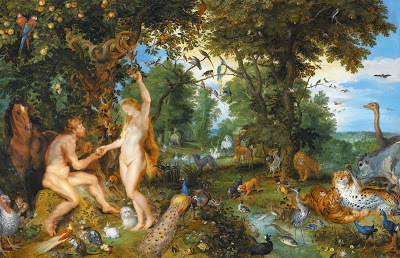
The power of ambiguity in Poetry, and in Literature in general, cannot be underestimated; it is within it that the reader and the writer dance, their steps resembling a waltz when both minds align, more akin to a tango when they attract yet fight each other. The writer, however, is the leading partner and has a privileged position; the key is in her or his hands, though what is behind the door can only be created with the participation of the reader. The author can create tension between form and meaning, and engage the reader in a game that has no solution, yet whose premises are inscribed in the words of the text.
Personally, I find that the masters of ambiguity the most interesting writers. Ambiguity should be read as an opportunity of exploration, not as a source of frustration. Going back to my post on the memory of poems, if Literature extinguished its expressive possibilities within a reading, we would not have had any of the Classics. In fact, though I shall return to what I believe makes a classic later, most people, when asked how to define one, would agree on saying that it has stood the test of time. One of the conditiones sine qua non that allow a text to stand the test of time is that the text cannot be fully decoded, explained and exhausted within the generation that produced it (while remaining relevant for future generations), thus, the necessity of ambiguity in texts is paramount, in my opinion.
One of the easiest ways of allowing ambiguity is through grammar; all languages I know offer a plethora of opportunities to play with clause and sentence structure to translate syntax, if not into μύθος, at least into λόγος, or, to simplify things, to use language, if not to create a whole system of understanding, at least to create the opportunity for meanings (the plural is deliberate).
Of the great masters of ambiguity, one who is especially dear to me is the greatest Poet in the English language, of course, John Milton. I shall only look at some examples of how he uses it, and how by doing so, he invites the reader not just to decode, as if he or she were a calculator, but to think, which are clearly two distinct processes, one deductive, the other intuitive in nature. Thus, 'Her hand soft touching,' in Paradise Lost , Book V, l.17, plays with the ambiguity of whether soft is an adjective referring to Eve's hand, or an adverb referring to the way she was 'touching'; delicate yet deep though the distinction might be, one has to then look at this line within the context of Book V, where Eve is, importantly in my opinion, under close scrutiny, as this is the Book in the poem where The Fall is 'prepared', thus, Milton, with a simple rhetorical inversion coupled with the typical self-referential nature of the epic, creates a dynamic contrast with the memorable tactile experience the reader is presented by the great Poet when the Mother of Humankind, in Book IX, l.789 'Forth reaching to the Fruit, she pluck'd, she eat;' and the colossal and terrifying consequences of such curt, yet small action in the following line: 'Earth felt the wound.' Thus, the distinction between whether Eve has a soft hand or touches softly on that occasion has immense consequences on the way we interpret her character, the poem, and even the whole History of Humankind, ranging between attributing our condition to the nature of Humans (here Eve), with the ability of being soft, yet also capable, by choice, to change the life of billions to come, or the unforeseen consequences of a small action carried out by someone who has, as her attribute, softness within herself, an adjective which here extends to its wide range of meanings, yet who commits a fatal mistake.
Now, when looking at Poetry, we need to remember that every authorial choice has, a bit like Eve's actions, immense consequences on what follows, on how a poem can be read, on how open we leave it to interpretation, on how far we want our readers to contribute to its meaning.
In my little way, when I say I am influenced by certain authors, I mean not just that I admire them, but that I try to learn lessons from them, and apply them to my own work. Thus, whilst I know that using rhetorical inversions nowadays can be seen as an obsolete exercise in embellishment (the whole of rhetoric is far too often seen as nothing more, to paraphrase Milton, than an 'unnecessary adjunct' to modern writing), I have been asked why in 'Shadow Whisper' from Queer Poems I wrote an 'uneasy line' and what I meant by it: 'When echoes shadow sparks'. While in my mind the syntax is clear, because being the writer has privileges in starting the ambiguity, but takes away the beauty of running away with it and creating meanings, while I can say how I conceived that line, I cannot have a final say on how it should be read, however, in my mind, the line is object, subject, verb, which is an unusual and uncomfortable construction in English, made even more uncomfortable as it is a trimeter in a tetrametric poem, and with the verb 'to shadow' being an uncommon one in such a context, I debated with myself on whether I should have written 'When shadow echoes sparks', or softened it with the close assonance of 'When' and 'echoes' thus pushing the resulting heavier stress in 'shadows' forward; as this allowed for more ambiguity, as well as with a curter ending, my choice was to leave to the reader the option of reconstructing the line and its possible meanings as she or he thinks fit.

Published on December 15, 2014 10:16
Gay Literature
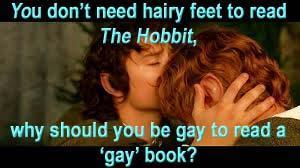 'Gay' Literature
'Gay' LiteratureStill in a ghetto, unfortunately, 'gay' literature is, in my view, a bit of a misleading tag, nota bene, not a genre, by any means, but a tag. What do I mean by this? Gay is a theme in Literature, not a structure: genre should not be defined according to themes, nor according to who reads and who writes texts, but according to structure. A tag... well, that's another matter altogether. A tag is just a promotional tool; in a world of tiny boxes promoting tiny thoughts, tags have come to be identified with 'genre', in my view erroneously and dangerously. If we look at books with a gay theme, we will find that there are a plethora of different genres that include gay characters, gay themes etc. historical fiction has regaled us with some great gay characters, memoirs, epistolary novels, Bildungsroman, simply fiction, or romance. So why tagging? I wonder if other books are tagged according to the habits and preferences of the characters. In which case, I would like to see tags such as 'pub-going', 'wine drinking', 'teetotaller', 'couch potato'. Yet, a symptom of how little we have moved into real integration, these tags still seem to be mainly based on what British Law defines as grounds of discrimination: age, gender, race, sexual orientation, religious persuasion, and the only one yet missing in the tags, disability.
Let us be clear, I am all for celebrating cultural identity; I just don't think that tagging is the right way to celebrate. Why? To start with, they are restrictive and diminutive. In the same way as they direct some readers towards a book, they also direct other readers away. Could I care less if the protagonist is purple-skinned, has pink eyes or is a Jedi? No. My issue with this, as a reader, is that I would be choosing my reads not on the basis of the universality of human experience, but on the categorisation of the themes. Life is not mono-thematic. The answer, very often, when one mentions life and books in the same sentence, is that some readers read books because they want to escape from reality. Yet that is not an answer: escapism is fine, but there is a huge difference between escaping (moving away) and running into. Double Speak has become the norm nowadays, and escapism should, by definition, offer alternative perspectives, the discovery of a dimension one does not live in, or does not know. Tags promote the exact opposite.
Now, put your hand on your heart and ask yourself, 'How many times have I not picked up a book because it's tagged as 'gay'? Unfortunately, that seems to be the case for many a reader. I don't know if the impression with the 'mainstream' readership is that 'gay' books are all about sex, which I understand may put readers off, either because they prefer to mind their own business when between the sheets (a choice that I subscribe to) or, in more unfortunate cases, because intercourse between two people of the same sex is a no-no for them, or, I may add, because 'gay' (let me say LGBT) 'does not concern their lives'. Well, I hold the belief that the every Human Being should be the concern of other Human Beings: let's leave 'me-me-me' as a bad habit of the 1980s, and try to know each other instead.
The problem with the tag 'gay' specifically, is, and I don't agree with those who still promote this view, and, thankfully, the 'gay press' has moved away from this, and new papers are now presenting LGBT, and specifically male gay, films, theatre, even books, rather than the stereotypical gay sex-addict-image-obsessed-shallow-person. May I here direct an apostrophe to Mr Gay UK? Why not, just once in a while, give the prize to a gay man who has done something with his brain and his heart, not just with steroids? May I suggest Peter Tatchell? Or choose a Doctor?
But back to the tag 'gay'. Unfortunately, the modern world confuses sex with sexuality; we live under the heel of coarse generalisations; well, they are two different things! I do know gay men who have a gay sexuality and never had sex. Does that make them 'ungay'? Nope. Sexuality and gender are a matter of identity, sex is an anatomical feature or a physiological act, which does, through its kissing with Eros, affect feelings, emotions and personality, but that is only via the kiss of Eros (and again, erotic is not sex...it's our feelings coming from attraction and sexual encounters, not the act itself, let's keep the words meaning what they actually mean and stop this continuous meaning-shifting, which is hypocritical).
If you have never read a 'gay' book, then, you may not know that there simply ain't as much sex in it as it appears to be the general perception. E M Forster's most confessional and, in my opinion, best novel is Maurice , and yet it is no where near as popular as other novels of our great genius of Literature that are not 'tagged' as gay. Is there sex in it? A hint at, with the beauty of authorial silence. What is authorial silence? An author moves away from the sex scene, not because the author is prudish, but because the author shows respect for the characters and steps aside, leaving the reader to imagine intimacy. If the author stays there...well, let's say there one person too many watching the scene. Of course, authorial silence is at the discretion of the author: some scenes may be described, I would think, 'gay' books keep them to a minimum, only when necessary. What do I mean as necessary? Let's simply say when they are not there to sell the book, but because a particular moment has profound consequences on the character or on the plot, and thus is necessary. Even there, there are ways of showing respect. I am not prudish, don't get me wrong. Sex books are fine (I don't subscribe to the connotation of porn, another misnomer), but the tag... That gives the wrong impression! See where I am going?
Now, this tag is, among other factors, one of the 'walls of the ghetto'; 'gay' literature is still very much in the ghetto (euphemistically called 'a niche'), yet struggling to get out of it. Sometimes, unfortunately, in order to make a point, and make a breach into the 'wall of the ghetto', it is necessary to insist on one's identity. This is a double-edge sword though, if misinterpreted, the insistence on identity can become irksome, annoying, off-putting. Well, just keep in mind that we are in what one hopes is a transition phase towards integration, and there is no integration in society without cultural and literary integration. Let us see what we have in common, rather than stressing differences, yet be proud of our identities: you don't need to have hairy feet to read The Hobbit, why should you be gay to read a 'gay' book?
My experience as a reader
I must have read my first LGBT novel, if one excludes novels that have LGBT protagonists, but, for whatever mysterious reason, are simply classed as Literature, including one of my all-time favourites, Mrs Dalloway , when I was in my twenties, The Color Purple , and my first 'gay' novel in my very late twenties, The Boys on the Rocks ; actually, as I am writing this, more and more titles come to mind that had slipped my literary gaydar, but that, in my opinion, only adds to my 'hairy feet' point: I had no problems whatsoever identifying with characters who have traits that are far from my experience, in the end, Human Beings are capable of empathy, which I fear is now changing meaning into 'egopathy' or 'autopathy'. Far too often do I read comments along the lines of 'I could empathise with the characters because s/he is like me,' well, that is no empathy at all; empathy requires the bridging of barriers between differences. This trend is worrying me, to honest; I am very aware of how Literature, and the reception of Literature, can be conditioned to change our mind sets, and if this is the trend, we are moving towards an isolating culture, where the individual seeks confirmation of her or his own identity in Art. whilst there is nothing wrong with reading to know oneself, we need to remember that we are also social beings, and our empathic skills are like muscles: if we do not use them, they atrophy. So, as my reading experience has been mainly the canon, have I ever had problems identifying with experiences that I have never had? No. I empathised with Madame Bovary, with Liz Bennet and many women, yet, to my knowledge, I am not a woman, and, with reference to the latter, have never wanted to marry. Should I have put Pride and Prejudice down when reading its famous first sentence, which had nothing at all to do with myself, my aspirations and my experience?Having discovered LGBT fiction, did my reading habits change so that I would only read boos on this them? You know the answer.
My experience as a writer
'Yes, but three of your books have LGBT content.' I've hear you, yes. That is simply because, while as a reader empathising is an acquisition of experience, I would even venture to say of Soul, writing is a sharing of it, and I cannot possibly share anything I have not lived myself. This does not mean, though, that the LGBT content is all there is in my books, on the contrary; lots of reviewers have not even mentioned the LGBT themes, and that pleases me, because it means that empathy may be under attack, but is not dead. Readers and reviewers have seen and followed other major themes, and I find that very encouraging.This also brings me with an issue I have with the 'tags' I mentioned above: they promote 'monothematism' (I am in a mood for neologisms, yes); id est the focus on individual themes in books, of which I am not a fan, not at all. Starting from the principle that every word has a range of meanings, why should we limit ourselves to a linear exploration of themes? Reality is not like that; in my opinion, reality is multi-layered, and choosing to neglect all apart from one (or a few) is imposing limitations on our understanding. Let us take a common theme, love: does not falling in love affect the way you perceive the world, the way you act, the way you eat, the way, to be modern, you text, your friendships, your work, which films you watch et cetera?
Published on December 15, 2014 05:35
Deconstructivism
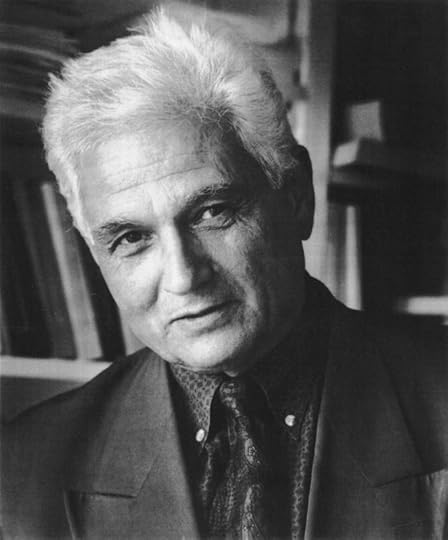 Jacques DerridaSimple Deconstructivism
Jacques DerridaSimple Deconstructivism What follows is a post of mine on Goodreads when I was asked to explain Decomstructivism in a simple way.Ok, to understand Deconstructivism, the first thing to do is look at a philosophical concept and semiotics in conjunction. Heraclitus, one of the oldest philosophers of Ancient Greece, and someone whom I think Western Thought should consider more carefully, states that the concept of opposition between two things, two ideas, is necessary for the very existence of these two ideas, thus, the two ideas are mutually innate: if I say evil, I implicitly deny good. There's no good without evil and vice versa.
To understand Deconstructivism we need to be able to bypassed our conditioned thinking whereby one excludes the other; on the contrary, one needs the other for it's own existence.
Where Derrida pushes the exploration is into the very nature of this apparently paradoxical thought. Let us apply it to language. Whenever we put two or more words within a syntactical structure, we create a relationship between/ among these words. Taking a simple sentence, 'I love you,' by doing so we have created a complex semantic system whereby 'I', 'love' and 'you' are organised so that the speaker has created a preferential way of representing reality. What the speaker is saying is that the speaker 'loves' a person defined as 'you'. This is what Derrida calls 'authorial genesis' id est the ability of a writer (or thinker, in general) to create a complex reality by making choices in both paradigm (the choice of words) and syntagm (how these words are linked). The thinker could have changed such genesis by saying, 'I love chocolate' (paradigm) or 'You love me' (syntagm): in both cases, what the thinker expresses is different from our original statement.
The very possibility, though, of this difference is important, as it tells us about the intentions of the thinker, who has chosen to define his or her thought by a series of oppositional choices: this, to start with, gives us an insight into the intentions of the thinker. Why did he or she choose the word 'love' for example. And in choosing so, the speaker has also introduced, vide Heraclitus, the concept of 'hate' as well, one could suggest, as 'indifference', 'like' 'loathe' etc... In order to define 'love' we need to exclude all that isn't love: Derrida calls this 'differance' (spelt with the a): difference is a textual necessity, every text is made up of what is in it, as well as what has been left out but implied in it.
Just going back to our sentence, the syntax has united three different words, each with its own differance: 'I' is not 'she' as 'you' is not 'chocolate'. Thus, if it is true that in order to define 'I' I must imply 'not I', a simple sentence such as our 'I love you' opens up an already impressively huge number of possible interpretation, if we stop just thinking only about what the text says, and start thinking about what the author has decided not to insert in the text.The corollary is that there is no final interpretation of the text.
Let us put our sentence in context; 'I' might have hated 'you' first, in which case, the very sentence 'I love you' also implies not just 'I don't love you' but 'I have experience hatred towards you, thus my love is conscious of hatred for you'. Let me be romantic with the lower case for a while: if you have experienced love that comes from hatred, or switches, that is not the same feeling as love that is simply defined by its opposition to hatred but has not made hatred part of itself. Imagine this on the scale of a novel: the possibilities of interpretation become almost infinite.
When we say that a Deconstructivst interpretation of a text is impossible, we mean that any interpretation creates alternative interpretations, thus, the stress should be on 'a'. Every text has, if we interpret it, an aporia (from Greek, α (without) ποιος = passage): it is a point at which the text reaches a point where it stops reflecting its structural meaning, a point where there is no meaning that can be conveyed through thought, as interpretations are, as we have seen, infinite.
Published on December 15, 2014 02:44
The Memory of Poems
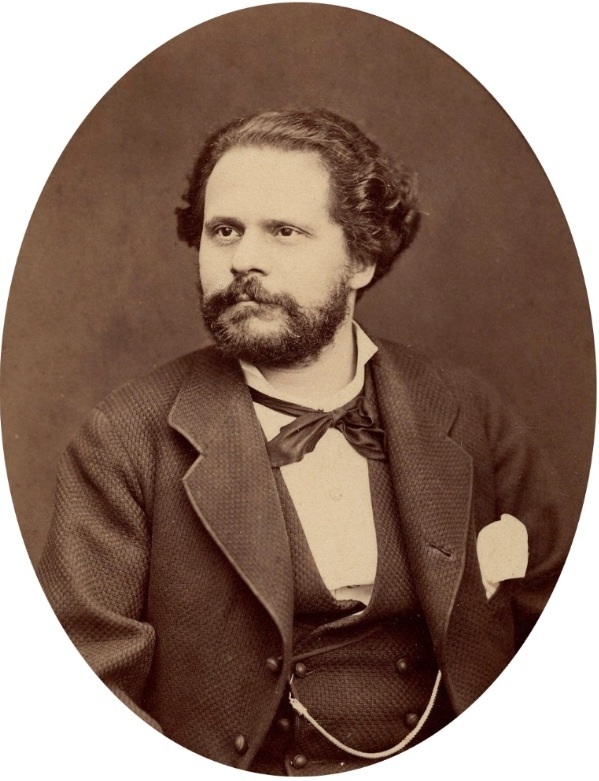
The Memory of Poems
Poetry has been one of my greatest passions ever since I was a child; I remember how when I was at primary school, we had to memorise poems, and the one that stuck with me, which I can still recite by heart is 'Pianto Antico', by a famous Italian poet, Giosuè Carducci, and I wish to start talking about this noble art starting from my experience of this poem. 'Pianto Antico' is a poignant poem, written by Carducci to come to terms with the loss of his three years old son Dante. Incapable of addressing his pain directly, the speaker starts with the memory of a pomegranate tree, which has re-blossomed after his beloved son has passed away; the contrast between the 'terra fredda', the 'cold land' (also earth) where Dante appears to be at the end of the poem and the lively blossoming of the tree (for those who have seen the beauty of a pomegranate tree in blossom, with its many big, bright vermillion tubular flowers this painful comparison cannot but be evident), is enriched and brought to a higher level by the traditional symbolism that this tree has had in our History: the pomegranate is both the symbol of luxury and has been identified with the bearer of the Forbidden Fruit, following studies in the Mesopotamian origin of the accounts in Genesis, where kings were also gardeners, and where, some say, the Original Sin may be greed, even money itself. Here, the heart-rending thought that while others may pursue their material greed, while the speaker only craves to have his son back is maybe only an idea of mine, but the excruciating span of the chasm of loss is stretched to incommensurables pain by the speaker's hint that all his aspirations were snatched away from him with the demise of Dante, and now he can only call his life 'inutil', 'useless' or, with comfortable metalepsis, 'meaningless'.
The impact this poem has had on my life has been huge: memorising it and reciting it was only the beginning of a long relationship between the poem, and poetry in general and my self, my conscious and subconscious, which has been running deep and sinking even deeper as the years went by. If I look back at this poem, most of what I have learnt from it happened long after I left primary school. The same has happened with many, many other poems in my life; what primary school gave me was a first encounter with it, which was made more permanent and more influential by memorising it. I still try to memorise as much of a poem as I can, because I know poetry has a delayed effect; it creates ripples within one's soul which grow into billows as years go by, and the fist contact between, let us say, the pebble and the surface of the ocean of our culture is small, sometimes invisible, yet what we perceive is the sound of the splash.
It is this splash that we need to remember, the sound of the poem remains, in my opinion, the only door into Poetry. Poetry was born as an oral art, The Odyssey was committed to paper when Homer decided to encode a story, with many different sources and versions, that had be handed down for centuries on the waves if the Eastern Mediterranean. Going back to 'Pianto Antico', only many years after I learnt it by heart did I realise that great part of my emotional response to that splash came from the sustained alliteration of the liquid 'r', which later on, I thought would have an mellower yet more personal and plaintive effect if I read it with the particular sound of the letter as Tuscans like the Poet do, where the letter 'r' is slightly softer than in Standard Italian, and followed by a slight aspiration.
Music and Poetry have the same origin, and what I find a big loss is the new-fangled trend in education which considers memorising poems obsolete: in my many years as a teacher, I have found that students actually like memorising poems, in the end, they memorise songs, don't they? No one expects students to learn the whole of the canon by heart, but the very experience of internalising the sound of a poem is, in my opinion, a necessary step towards the appreciation of this beautiful Art. Sound leaves a 'memory trace' within our souls; it creates a link between the poem and it's emotional dimension, that will be recollected by the reader every she or he feels that emotion, thus giving the poem another breath of life, and allowing the reader to reconsider the poem in the light of new experience. A poem cannot be sentenced to death by limiting its life expectancy to the span between a lesson and an exam; a poem lives for as long as its emotional impact survives in the readers.
I shall leave you now with Carducci's poem, and, as I understand not everybody reads Italian, a link to a translation, still, as T. S. Eliot teaches us, try to read its original Italian sound, even if you don't understand the words...
Pianto Antico
L’albero a cui tendevi
la pargoletta mano,
il verde melograno
da’ bei vermigli fior,
nel muto orto solingo
rinverdì tutto or ora
e giugno lo ristora
di luce e di calor.
Tu, fior de la mia pianta
percossa e inaridita
tu de l’inutil vita
estremo unico fior,
sei nella terra fredda
sei nella terra negra
nè il sol più ti rallegra
nè ti risveglia amor.
Giosuè Carducci, 1887
A translation of 'Pianto Antico'
 Pomegranate flower
Pomegranate flower
Published on December 15, 2014 02:02
December 14, 2014
Poetry
Poetry
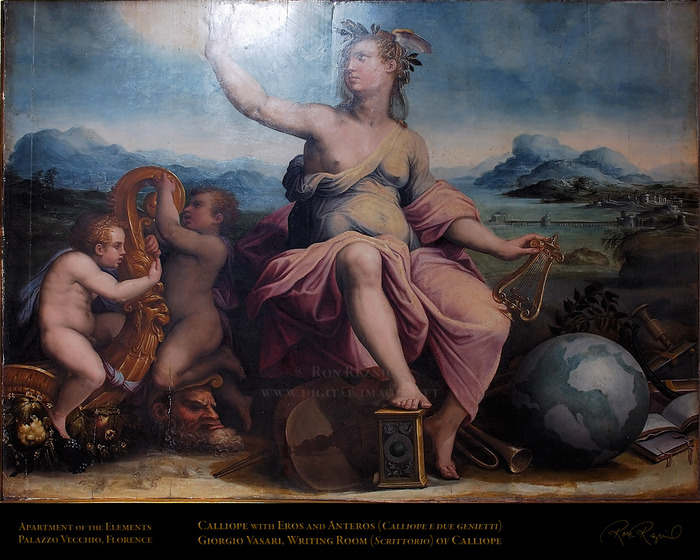
I've been thinking about posting on Poetry for some time. Of all the Arts, Poetry is my first love, and, you may expect, it remains in a special place in my heart.I cannot start talking about it, however, without a tribute to the Muses, so, the reproduction of Giorgio Vasari's painting Calliope with Eros and Anteros, oil on canvas, 1555-57, Palazzo Vecchio, Florence, seemed a fitting one. I chose this painting because, in a world of discrete boxes and servitude to realism, it reminds us of how Art is rich in, I would even venture to say dependent on, symbolism and how all the Arts are close sisters. In fact, Calliope, strictly speaking the Muse of Epic Poetry, yet seen as the Muse od Poetry in general, is surrounded by the symbols of the other Muses. On her side, we see Eros and Amteros (the god of requited love), the two cupids, one of whom modern culture seems to have almost forgotten, playing on an S shaped cornucopia, where S stands for sol, the Sun, whom Calliope is addressing by extending her free hand. So, this will be where I post my ramblings about Poetry, maybe to explain to myself why it is so important and what is happening in Poetics in the contemporary world.
Being myself a poet, I need to understand where my writing comes from, and where it sits in the literary tradition. My influences are clear to me, and, following from what T.S. Eliot says, discovering how one works as a catalyst is not an easy matter. I have recently published Queer Poems, and found myself looking back at the Old Possum's lessons once again; while my earlier work was soaked in his parodic method, in this later effort of mine, I found myself trying to learn how meter and rhyme can express frustration, and trying to follow the path he showed us in his 'Preludes' back to the use of digressive imagery, that two great loves of mine, Vergil and John Milton preferred over organic images.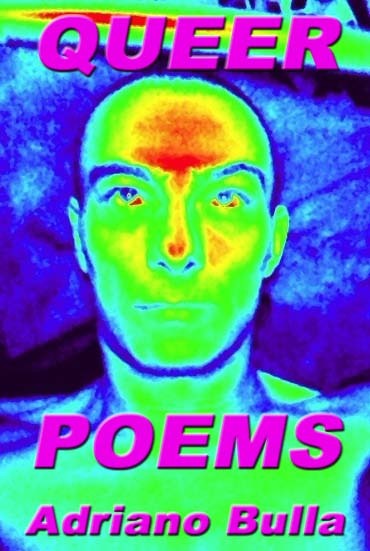

I've been thinking about posting on Poetry for some time. Of all the Arts, Poetry is my first love, and, you may expect, it remains in a special place in my heart.I cannot start talking about it, however, without a tribute to the Muses, so, the reproduction of Giorgio Vasari's painting Calliope with Eros and Anteros, oil on canvas, 1555-57, Palazzo Vecchio, Florence, seemed a fitting one. I chose this painting because, in a world of discrete boxes and servitude to realism, it reminds us of how Art is rich in, I would even venture to say dependent on, symbolism and how all the Arts are close sisters. In fact, Calliope, strictly speaking the Muse of Epic Poetry, yet seen as the Muse od Poetry in general, is surrounded by the symbols of the other Muses. On her side, we see Eros and Amteros (the god of requited love), the two cupids, one of whom modern culture seems to have almost forgotten, playing on an S shaped cornucopia, where S stands for sol, the Sun, whom Calliope is addressing by extending her free hand. So, this will be where I post my ramblings about Poetry, maybe to explain to myself why it is so important and what is happening in Poetics in the contemporary world.
Being myself a poet, I need to understand where my writing comes from, and where it sits in the literary tradition. My influences are clear to me, and, following from what T.S. Eliot says, discovering how one works as a catalyst is not an easy matter. I have recently published Queer Poems, and found myself looking back at the Old Possum's lessons once again; while my earlier work was soaked in his parodic method, in this later effort of mine, I found myself trying to learn how meter and rhyme can express frustration, and trying to follow the path he showed us in his 'Preludes' back to the use of digressive imagery, that two great loves of mine, Vergil and John Milton preferred over organic images.

Published on December 14, 2014 10:16
Poetry
 I've been thinking about posting on Poetry for some time. Of all the Arts, Poetry is my first love, and, you may expect, it remains in a special place in my heart.
I've been thinking about posting on Poetry for some time. Of all the Arts, Poetry is my first love, and, you may expect, it remains in a special place in my heart.I cannot start talking about it, however, without a tribute to the Muses, so, the reproduction of Giorgio Vasari's painting Calliope with Eros and Anteros, oil on canvas, 1555-57, Palazzo Vecchio, Florence, seemed a fitting one. I chose this painting because, in a world of discrete boxes and servitude to realism, it reminds us of how Art is rich in, I would even venture to say dependent on, symbolism and how all the Arts are close sisters. In fact, Calliope, strictly speaking the Muse of Epic Poetry, yet seen as the Muse od Poetry in general, is surrounded by the symbols of the other Muses. On her side, we see Eros and Amteros (the god of requieted love), the two cupids, one of whom modern culture seems to have almost forgotten, playing on an S shaped cornucopia, where S stands for sol, the Sun, whom Calliope is addressing by extending her free hand.
So, this will be where I post my ramblings about Poetry, maybe to explain to myself why it is so important and what is happening in Poetics in the contemporary world.
_____________________________________________________________________
Being myself a poet, I need to understand where my writing comes from, and where it sits in the literary tradition. My influences are clear to me, and, following from what T.S. Eliot says, discovering how one works as a catalyst is not an easy matter.
I have recently published Queer Poems, and found myself looking back at the Old Possum's lessons once again; while my earlier work was soaked in his parodic method, in this later effort of mine, I found myself trying to learn how meter and rhyme can express frustration, and trying to follow the path he showed us in his 'Preludes' back to the use of digressive imagery, that two great loves of mine, Vergil and John Milton preferred over organic images.

Published on December 14, 2014 01:36
December 7, 2014
Blog Hop - Seven Things You Didn't Know about me
 Hello,
Hello,Long time, I know; I'm not a natural blogger, in fact, I joined Wordpress and never got past uploading my picture on there...
Still, I have to bow to Clive S. Johnson not just for being an outstanding Poet and writer, but for inviting me to join this blog hop . I'll be honest; it took me some time to understand what a blog hop is, and he explains it much better than I could ever do on his blog post>>> , among his many other wonderful posts, which include previews of chapters from the Dicca Series and his beautiful poems...
So, seven things I think readers don't know about me...
1- Have you ever heard of synaesthesia? I'm not talking about the literary device here, but the 'condition', as I think it's defined as, though I feel the two things are connected. Well, if you haven't, I suppose I'm a good person to explain it, because I'm synaesthetic. The word means 'the mixing of the senses', but I prefer the more positive definition as 'the spreading of the senses', though, trust me, it does mix you up! How to explain it? I'll give you the example of the most 'common' (it's a rare condition) type of synaesthesia, the same one I have (some people say suffer from, I'd think I enjoy it...): when I hear a sound, I also see a colour... These colours appear as flashes of light in front of my eyes, there's no way you can get rid of them, and the flashes have many hues in them, they are very detailed indeed. The colours I see depend on the quality of the sounds I hear; the funny thing is that talking to other synaesthetics, we have found that we tend to see the same or similar colours for the same sounds. This has some consequences on my life; for example I get lost all the time... Imagine, you take a walk, see a house as a reference, take a turn, and then look for it again, but the sounds around you have changed... It confuses me so much! My thing is that I love colours, big time, and I use them as references... Not a clever move, but I go round and round in circles a lot. I think it helps me write though; I often describe colours as sounds and sounds as colours, and at a more artistic level, I mix music and paintings, I sort of see them as being very similar. This happens also when I think of words, or write them down.
There are different kinds of synaesthesia and I am not sure if I also have a touch/sight/hearing one, but I know that the very feeling of writing, and this is one of the reasons why I write by hand, gives me very strong sensations.
The last thing I want to say about synaesthesia is that, in my personal experience, synaesthetics recognise each other instantaneously; there aren't many of us at all, but, well, I can't explain how, but we just know we are...
2- I love gardening and plants; I think many of us do, and I've always thought I'd like to be a gardener. There's something wonderfully therapeutic about gardening, there's the fact that you are nurturing another living being, the fact that you have time to meditate and the fact that you are part of a process that does not give you immediate results, you have to wait for them; this for me creates a form of anticipation of joy as well as a delayed happiness, which creates waves back and forth in time... My favourite flowers are orchids; they are incredibly sophisticated and they have a very slow metabolism; they fascinate me so much. And yes... I hug trees and talk to plants...
3- I am obsessed with time. I've never fully worked out what time is; as a child and adolescent, I used to envisage time as a spider in whose web our lives fell. I'm not sure about that now, but I still am engrossed by anything that has to do with time. I don't for a second believe (hyperbole, sorry, let's say I am not convinced) that time is linear and only goes in one direction. Classical perceptions of time used to see it as a helix, though more simplistically it's referred to as circular... I think we Humans are limited in our perception and only see time as a line, but, as Blake said, 'If the doors of perception were cleansed...' (Yes, I love The Doors, as an addendum).
4- I'm not a great fan of Darwin... Apart from having issues with Darwinian Evolution from a scientific point of view, which I won't enter into here, I have huge concerns about the ethical, moral and philosophical consequences of Darwinism... . Darwinian Evolution is based on the survival of the fittest, and this is the point that seems to crumble under scrutiny; the very known history of Mankind has a long span when we were by no means competitive, and there is no reason whatsoever why we should have evolved in that direction, losing quadruped speed for biped, and only later start using hands to gain a competitive advantage. Oddly enough, the 'second generation' of dinosaurs had done the same... But the biggest issue I have with Darwinian Evolution is ethical: all the excuses of the modern world are based on it, Hitler saw the colossal potential of Darwinian Evolution to justify his politics; Capitalism has repackaged and resold the same ideology as Hitler... If you are poor, tough luck, that's what the survival of the fittest is... Not only tough luck, but blame yourself, you are not fit enough. Now, even assuming it worked in nature, aren't we meant to be 'evolved'? There is no social evolution without contemplation and self-correction, yet we still work along an ideology which is bestial in the worst possible sense....
5- I walk for days sometimes... I roam the streets aimlessly, or without a destination, I should say, and I can do it for days on end without stopping. I even rarely eat on those days, I just go round... I do get exhausted and all dirty and sometimes have little accidents along the way (fall into bramble, etc), but I don't really mind. It all started when my best friend and I decided to have a holiday together, an unusual one for most people, I'd think... We left our wallets, keys etc with a friend and went onto the streets of London to sleep rough. It was the summer of 2007, a really disastrous year for both of us; it looked like every single day Fate had a bad surprise for us, and we really could not stand it any more... The time we spent on the streets was, oddly enough, in a way, the most constructive we had that year... Sleeping rough is scary, horrifying: you really never sleep, every little noise makes you shiver, you are targeted by lots of idiots, who, maybe for fun, decide to urinate on you etc. But that's not what scares you... What scares you is that as soon as you let your guard down, you are totally vulnerable to violence, assault, even rape... There were two of us, so we were safer, but... I can still hear the every step approaching and feel the dread of not knowing the person's intention. Then there's the horrible neglect of so many people who literally pretend you don't exist. So many people won't even look at you, let alone speak to you. On the other hand, we met some wonderful people, homeless or those who just pop by with a roll of bread... And you think of how much you chuck in the bin without a second thought every day, how much the supermarkets throw away (may I praise, and call it publicity if you wish, Pret a Manger, who give all the food and drinks they have left over at the end of the day to the poor? A simple, clear and beautiful example...) Now, unfortunately, my best friend is still always with me but not physically, and I don't even try to close my eyes, I just walk. I still talk to people I meet on the way, but, who knows why, I don't sleep on those days...
6- I eat a lot, when I say a lot, I mean an enormous lot on a normal day. I usually go through six full meals a day, but can go much, much further. Then, as I said before, I have whole days when I don't eat. I eat healthy food though, I think I have not been to that famous burger place that I won't mention for at least ten years. That sort of food does not appeal to me... I cook most of my meals as well, storm scratch, I even make my home made bread.
7- My first memory is when I was very, very little; a few months old, I know that because I remember the cot I was in. It's a strange memory though; I've never been able to make much sense of it. I was lying in the cot, and that was clear, when suddenly I was picked up by something strange; it was purple/violet/auburn in colour; it picked me up and I felt myself spinning, with a weird zoom noise, then found myself crying in my partents' room, with my Mum and Dad looking over me. I remember the rooms well, I remember the decor, checked it, it is correct, it's th bit in between that I have never understood: I think I might have fallen asleep and what I remember is the 'shadow of a dream' I had, but have never really worked it out...
Now... The honour of inviting more writers onto this blog hop....
Robert Dunbar, the genius and author of very original and beautiful books such as Willy.
Roger Hardy, whose novel, Flight Into Darkness is not only thrilling, but had elements of prophecy in it.
Christoph Fischer, I've just finished Time to Let Go and loved it.
Lucie Novak, author of A Woman with (no) Strings Attached, and a real Dame.
Mark Nash, the author of 28 Far Cries and lots of flash fiction; like him, I am a supporter of short, non-redundant creative writing.
Vanessa Vanney Thompson; we met virtually and by chance and have ever since grown to know each other: I have the greatest admiration for her, she's one of those catalyst in the world who turn hardship into joy that she shares with the whole world, a bit like the Sun; poet (Words of Expressions on a Page: Poetry Love, writer of fiction, as well as children's books, a real eclectic with her pen and with her heart.
Paul Douglas Lovell, author of Paulyanna International Rent-boy; I feel a great affinity towards him; we both write starting from our own experiences (which match in many ways) and make fiction out of reality...
Kenneth Fore, because in his books, like THE WOLF TATTOO, he uses adventure and his own life experience to talk about the resilience and beauty of the Human Spirit, something we really need to rediscover in our days....
Doris Dawn, author of MATRYOSHKA - Sex in the Golden Age and many other books promoting freedom, for the mind, heart and sexual. Go on Sister!
Catherine Carrigan, a very positive and sunny person (just look at her smile) expert healer, and one of the few people in the New Age forum, author of What Is Healing? Awaken Your Intuitive Power for Health and Happiness and lover of orchids...
Roger Kean author of many graphic novels and historical novels such as A Life Apart and The Complete Chronicle of the Emperors of Rome; Vol. 2, but also a legendary trail blazer in the UK, editor of an iconic LGBT periodical that, unlike others, did not focus on muscles, but on serious issues and culture.
I'd like to invite Brandon Shire, do I need to mention any of his books? Well, The Value of Rain, Listening To Dust and many others... I know he's a busy man though.
Finally, an author who has just had her first novel, Becoming Julie published; an honest and courageous account about transsexualism, a topic that I feel is still very much misunderstood or forgotten; she's not on Goodreads but you can read about her book here>>
Thanks for reading,
Ade
Published on December 07, 2014 12:38
•
Tags:
adriano-bulla, blog-hop, clive-s-johnson, synaesthesia
January 12, 2014
The Road to London

'The sky and the ocean crossed your eyes and sank in my heart.'
The Road to London
Dear All,
VIDEO TRAILER of THE ROAD TO LONDON >>
An EXCERPT from the novel, the only one that's online is on Gay-Literature.com : EXCERPT, THE ROAD TO LONDON >>
I think it's always better if The Road to London speaks for herself...
This is where I will try to answer all your questions on The Road to London. There are, of course, questions an author cannot answer, because the novel belongs to you. But I'll try my best.
Ade
CONTENTS/POSTS
Just click on the title and you can read the post without scrolling up and down.
The Birth of The Road to London
Writing when dancing?
An Interview (link) + Picture of the Manuscript
LGBT Book Gem (link) + Review & Interview (link)
Radio Interview (14th June 2014 - with link)
Proud to Be Different
An Article on and a Review of The Road to London (links)
A Spot of Poetry (Poems in the Novel)
The London Club Scene
Dreams (and the Novel)
LGBT Bill of Rights (link)
Music and the Novel
Art in The Road to London
Homophobia
Cosmic Love (and Quantum Theory)
London
The 'letters' to My Dear
The Grey City
Fire
'Gay' Literature
Dreams of London
LIFE DREAMT and LIFE LIVED
ON AMAZON
Readers' reviews.
The Road to London on Amazon
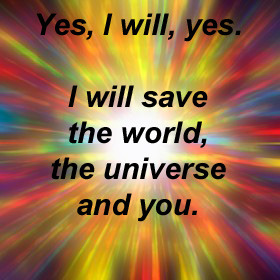
Published on January 12, 2014 05:36
•
Tags:
bildungsroman, bisexual-romance, coming-of-age, coming-out, fiction, gay, gay-fiction, gay-literature, gay-romance, lgbt, m-m-romance, novel, romance, the-road-to-london
September 19, 2013
At your service
As I promised, here I am to continue our conversation on literature or anything else you wish to discuss.
Ade
Ade
Published on September 19, 2013 13:18
•
Tags:
adriano-bulla, classics, comparative-literature, epic, latin, literary-theory, literature, novel, poetry, the-road-to-london, ybo-and-other-lies



